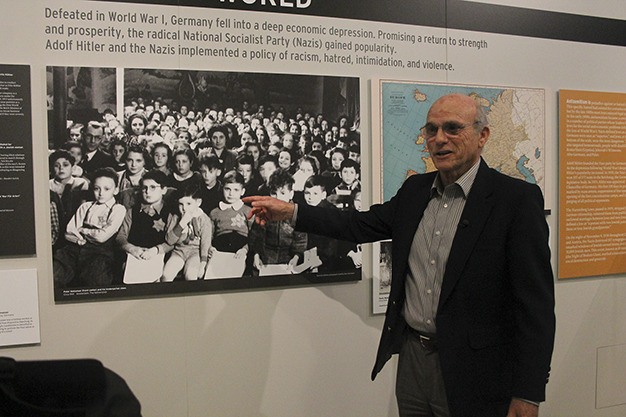A first-of-its-kind Holocaust museum in the Pacific Northwest opened its doors to the public Sunday, Oct. 18 in downtown Seattle.
Located in Belltown on the corner of 2nd Avenue and Lenora, the Henry and Sandra Friedman Holocaust Center for Humanity aims to share the stories of local Holocaust survivors through artifacts and exhibits that explore pre-war Europe through the Holocaust to post-war liberation.
The museum is named after Islanders Henry and Sandra Friedman, who served as donors toward the opening of the center.
Friedman said for him, opening the Holocaust Center was 30 years in the making. He initially thought of such a museum while visiting the United States Holocaust Memorial Museum in Washington, D.C. with other survivors in the 1980s.
“I said to my wife, ‘Washington, D.C. is OK, but we are over 3,000 miles away. If we want to do something, we have to do something in Seattle,’” Friedman said.
Laurie Warshal Cohen, who works in special projects and development with the center, said the efforts of Friedman and fellow Islander Magna Schaloum speaking in schools in the ‘80s led to the founding of the Holocaust Center.
“They were concerned about Holocaust denial,” she said. “It got to the point where we wanted to have a space and our supporters wanted us to have a space. Our concept here is we want to tell the story of the Holocaust through the artifacts and pictures of survivors. They’re local, they’re real. These are real people.”
For Schaloum, an Auschwitz survivor who passed away last June, it was important to speak out so people could say they had seen and heard from a Holocaust survivor. Her son, Jack, is a member of the Holocaust Center’s Speakers Bureau and carries on his mother’s legacy by sharing her story.
“I think it’s not only important for the Jewish next generation to see it, but also for non-Jews to come and see exactly what happened,” he said. “It’s not just a museum for Jewish people per se; it’s a museum for the entire population to see what evil really happened and what evil can continue to happen.”
The museum anticipates 15,000 visitors in its first year. It will be open to school groups five days a week and open to the public Wednesdays and alternate Sundays each month.
Friedman called the opening of the Holocaust Center “a dream come true.” He said helping with its opening served as a final tribute of his appreciation for what America did for him as a Holocaust survivor.
“Unfortunately, anti-Semitism is still around, bigotry is still around, hatred is still around. This will be a place where people can come study and learn,” Friedman said. “We have to learn from history. This will be a place where old people and young people can share their vision for our future in America.”
For information about hours of operation or to reserve tickets for one of the Holocaust Center’s opening events, visit www.holocaustcenterseattle.org.




